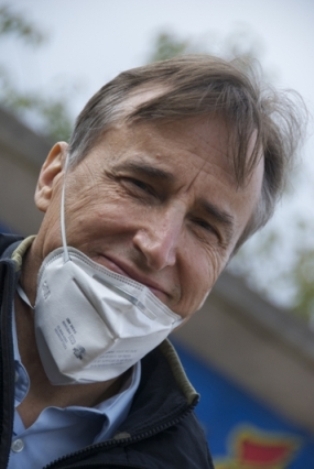Posted on : Jan.30,2019 20:17 KST
Modified on : Jan.30,2019 20:26 KST
 |
|
Stephen W. Linton, Chairman/Eugene Bell Foundation
|
 |
|
Stephen W. Linton, Chairman/Eugene Bell Foundation
|
From an early age parents and teachers encourage us to ‘dream big’. They know that dreaming can help one look beyond the present, set clear goals for the future and identify challenges that stand in the way of a brighter tomorrow.
Recently, dreaming big has helped make dramatic progress in inter-Korean relations. Changes in the international situation have played a part, but most of the credit goes to Korean leaders, South and North, whose dreams have begun to thaw the last frozen corner of the 20th Century Cold War.
Dreaming big, nevertheless, can also pose its own problems. The greatest risk to dreamers is to become so focused on their goals that they lose sight of everything else. Frustrated that sanctions have slowed the pace of progress in inter-Korean reconciliation, for example, should not blind Koreans to today’s opportunities.
Today, the biggest opportunity in inter-Korean relations is emergency aid. Historically the world over, being a good neighbor meant giving food to the starving, clothing to the naked, and medical care to the sick or injured. Today, this traditional definition of humanitarian aid has been overshadowed by more popular developmental aid programs.
Because traditional emergency aid does not promote economic development, it is not surprising that most aid organizations, including those working in North Korea, promote more popular developmental projects designed to make life better, rather than rescuing people whose lives are in danger.
Relative merits of different types of humanitarian aid aside, the distinction between developmental aid and emergency aid becomes critical when the lives of people in a sanctioned country are threatened. Even though the food situation in North Korea has improved, many people suffer from life-threatening diseases and cannot wait for the benefits promised by developmental aid programs. Thankfully, as evidenced by UN Security Council exemptions for tuberculosis assistance and US government assurances that travel related to emergency aid will be permitted, ‘life saving aid’ remains protected from sanctions even though programs designed ‘to make life better’ continue to face restrictions.
Koreans should take advantage of the fact that emergency aid is not subject to sanctions, not only to extend neighborly help to people in the north, but also to change their perceptions of Koreans living in the south. From the early 2000’s, the sheer quantity of aid sent to North Korea by South Koreans has far surpassed assistance provided by non-Koreans. But while more generous, South Korean aid has proved less dependable than aid from the international community because sudden shifts in government policies turned aid on and off unexpectedly. As a result of these experiences, North Koreans assume that non-Korean aid, though more modest, is more dependable than South Korean aid. For this reason, North Korean authorities tend to encourage South Koreans to give developmental aid while relying on non-Koreans to provide emergency aid, like tuberculosis treatment, that must be long-term to be effective.
The notion that South Koreans are generous but not as dependable as foreigners needs to be challenged, not only for the sake of needy people, but also for the sake of inter-Korean relations going forward. The sudden announcement in spring 2018 that the largest international emergency aid program in North Korea is closing provides South Koreans with an unusual opportunity to change this perception. The unexpected withdrawal of Global Fund aid for tuberculosis, North Korea’s greatest health challenge, is a golden opportunity South Koreans cannot afford to miss to link South and North through emergency aid.
Filling the vacuum in tuberculosis aid left by the Global Fund’s departure could be an important step toward building a common sense of community on the Korean peninsula. To begin to think and act as one community, needed most is a connection between South and North for the expression of neighborly feelings through the exchange of traditional emergency aid. Starting with the transport of non-sanctioned tuberculosis-related medications, supplies and pre-fab isolation wards, leaders in both societies should work together to open an overland ‘emergency aid corridor’ connecting the two halves of the Korean peninsula. Because emergency aid is not subject to sanctions, opening a permanent overland emergency aid channel is a dream that can be realized today. Taking this step would save countless lives and also help build the bedrock of mutual trust needed for national reconciliation.
By Stephen W. Linton, Chairman/Eugene Bell Foundation
The views presented in this column are the writer’s own, and do not necessarily reflect those of The Hankyoreh.
Please direct questions or comments to [english@hani.co.kr]








